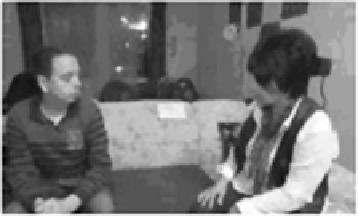Information Technology Reference
In-Depth Information
00:05.556: A expresses his
incredulity with his gaze
Speaker A's facial muscles are tense, speaker B avoids looking at A in the eyes.
Speaker B reinforces the attack with the rhetorical question: “ich wes nich (.) wie
könnt ihr hier n kind großzieh_n (
)” (
I cannot imagine bringing up a child here
),
which is an aggressive insinuation that Speaker A and his wife are bad parents.
00:00:05.685-00:00:12.269 B-Andrea: ich wes nich (.) wie könnt ihr hier n kind
großzieh_n ich kam in dat kinderzimmer rin (.)
<<
acc
>
dat war für mich der
blanke chaos
>
mir sind die trän_n gekomm_n
D
ick hab geheuelt (
I cannot imagine
bringing up a child in here. I entered the child's room, it was in a terrible mess, my
eyes started tearing up, I started crying.
)
The woman pronounces short staccato sentences which make her story more
dramatic and reinforce her credibility as a caring mother and housekeeper and
thereby justify her claim for authority. This deliberate construction of her image in
front of the interlocutor and in front of the public at home is stressed by the next few
sentences which lead to a dramatic climax that stresses her emotional involvement.
By describing the child's room as being in extremely bad condition: “
<<
acc
>
dat
war für mich der blanke chaos
>
”(
it was in a terrible mess
), the woman portrays
herself as a caring sensitive mother: “mir sind die trän_n gekomm_n
D
ich hab
geheuelt” (
my eyes started tearing up, I started crying
).
The climax in the woman's choice of derogatory expressions shows that she is not
paying attention to the man's feelings. In this sense, she is not cooperative in that
she violates dialogical principles (by ignoring the listener's backchannel signals
and acting in a self-referential way). These repeated attacks by B on the positive
face of A are stressed by her gestures and facial expressions. Repeated right-to-


Search WWH ::

Custom Search